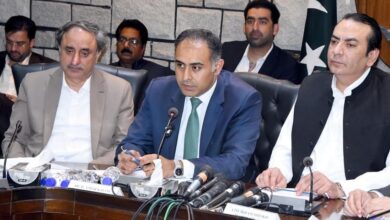Eu mentions Indian controversial policies in its report Human Rights
The European Parliament in a report has expressed concern over the situation in occupied Kashmir and controversial policies of the Modi government regarding minorities living in India.
The report prepared by the European Parliamentary Research Service (EPRS) said that after the recommencement of second consecutive tenure of Prime Minister Narendra Modi’s Bharatiya Janata Party after its success in the May 2019 general elections, the situation in India regarding democracy, tolerance, rule of law, and managing patchwork of cultures and religions had been changing in recent months under the impact of an ever-increasing Hindu nationalist grip on society and politics.
The report authored by Enrico D’Ambrogio, Members’ Research Service, said that Freedom House’s Freedom in the World 2020 report placed India under the spotlight and ranked occupied Kashmir as ‘not free’. “Some warning signs were already present during the first term served by Prime Minister Narendra Modi, in charge since the Hindu nationalist BJP won an absolute majority in the lower chamber (Lok Sabha) in 2014. Communal violence has increased, as have violence and discrimination against religious minorities, it said.
The report said the 2019 World Press Freedom Index has highlighted violence against journalists as one of the most striking characteristics of the current state of press freedom in the country. The government has banned several thousand non-governmental organisations (NGOs) from receiving foreign funding and has sought to get a firm grip on information technology, however, its proposed changes to the Information Technology Act have raised a number of concerns, it added.
Furthermore, the report said, the government members evoked limits on free speech and have equated dissent with a lack of patriotism. It said, India is a world leader in internet shutdowns (there were 106 such suspensions in 2019). In June 2018, the UN High Commissioner for Human Rights issued a report on Kashmir criticising the excessive use of force by Indian forces in occupied Kashmir, it said, adding the July 2019 version of this report found that India had taken no steps to improve the situation in Kashmir.
The EU report said that since the BJP’s May 2019 landslide electoral victory for the Lok Sabha the party had stepped up several initiatives catering to its Hindu nationalist electoral base. The report said a symbolic move was when in early August 2019, Jammu and Kashmir was stripped of its special status through the repeal of Article 370 of the Indian Constitution. It said, the move was preceded by a vast deployment of troops to the territory and the detention of thousands of political leaders and activists. It said, telephone and internet services were cut off and after several months of blackout, in January 2020 the Indian Supreme Court ruled that internet services could only be suspended temporarily.
The report said, two former chief ministers of Kashmir were released from house arrest only in March this year, and another’s detention has been extended to August; their privileges have been withdrawn; new political formations enjoying governmental support and potentially threatening the dominance of the traditional political parties have emerged; and a new law on domicile in Jammu and Kashmir has faced opposition from the political leaders of the territory.
It said a further issue prompting reactions all over the country, and concern abroad, has been the Parliament’s adoption of the Citizenship (Amendment) Act (CAA) in December 2019. It added amending the 1955 Citizenship Act, it enables migrants/foreigners from six religious communities (Hindu, Sikh, Buddhist, Jain, Parsi and Christian, but not Muslim) in three neighbouring countries (Afghanistan, Bangladesh and Pakistan), who had come to India before 31st December 2014, to apply for Indian citizenship via a fast-track route.
It said the adoption of the CAA has prompted spontaneous nationwide protests, some of which have been the focus of violent police crackdowns. It said, in most parts of the country, the narrative against the CAA is based on the government’s decision to grant citizenship along religious lines, which arguably undermines India’s secular tradition enshrined in the Constitution. Outright critics see the legislation as deliberately anti-Muslim, it added.
The report said, India’s Muslim majority already felt targeted when in July 2019 the Parliament passed a bill criminalising the Muslim practice of instant divorce (triple talaq). The government, it said, has announced its intention to move towards the launch of the National Register for Citizens. As many Indians lack the documents needed to attest their citizenship, they fear that the NRC in liaison with the CAA could lead to them facing deportation, it added.
The report said the UN Secretary General, António Guterres, has echoed these concerns, warning of the risk of statelessness. It said the UN High Commissioner for Human Rights, Michelle Bachelet Jeria, has filed an Intervention Application on the CAA to the Indian Supreme Court; the latter is due to examine more than 160 CAA-related pleas.
The report said, several hate speech incidents occurred during the BJP rallies in the wake of the 8th February 2020 election for the Delhi Legislative Assembly. It said a few BJP leaders and activists raised the slogan goli maro salon ko (‘shoot the traitors of the country’) in response to the protests against the CAA, symbolized in Delhi by a continuous sit-in in the Shaheen Bagh area.
It said on 23rd February, just before the US President, Donald Trump’s visit to India – which failed to deliver deals on trade or security – a BJP leader gave a three-day ultimatum to Delhi police to clear a protest against the CAA and the NRC by women at Jaffrabad metro station, threatening to intervene directly if his orders were not obeyed. Hours later, it said, three-day riots, mostly targeting Muslims, began in the north-eastern parts of Delhi; the tally was 53 dead due to physical assault or gunshots and 200 injured. Furthermore, the report said, houses and shops were burnt and mosques were vandalised.
It added on 26th February, a Delhi High Court judge who, as part of investigating the riots, had asked the police to register first-information reports against BJP leaders for delivering hate speeches, was transferred to another location with immediate effect, a move causing concern over the independence of the judiciary.





